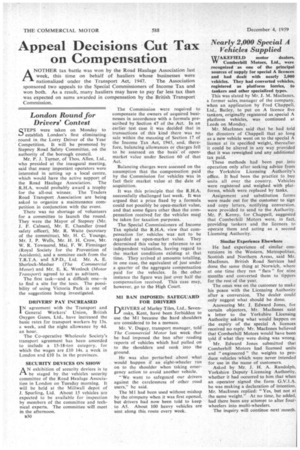Nearly 2,000 Special A Vehicles Supplied
Page 36

If you've noticed an error in this article please click here to report it so we can fix it.
WAKEFIELD motor dealers, Comberhill Motors, Ltd., were recognized as one of the principal
sources of supply for special A licences and had dealt with nearly 2,000 vehicles. They had converted vehicles, registered as platform lorries, to tankers and other specialized types.
This was stated by Mr. J. M. MacInnes, a former sales manager of the company, when an application by Fred Chappell, Ltd., Batley, to put on A licence five tankers, originally registered as,special A platform Vehicles, was continued at Leeds on Monday.
Mr. Mac Innes said that he had told the directors of Chappell that so long as a new vehicle went on to the special A licence at its specified weight, thereafter it could be altered in any way provided that it was reweighed and any additional tax paid.
These methods had been put into operation only after seeking advice from the Yorkshire Licensing Authority's office. It had been the practice to buy units all over the country. Vehicles were registered and weighed with platforms, which were replaced by tanks.
Assignment and substitution forms were made out for the customer to sign and copy letters, notifying conversion, were provided to send to the Authority. Mr. P. Kenny, for Chappell, suggested that Comberhill Motors were, in fact, providing tankers and the licences to operate them and acting as a second Licensing Authority.
Similar Experience Elsewhere He had experience of similar conversions in the Western, Metropolitan, Scottish and Northern Areas, said Mr. MacInnes. British Road Services had done the same thing at Norwich, where at one time they ran " flats " for nine months • and converted them to tippers for the rest of the year.
The onus was on the customer to make his peace with the Licensing Authority after a conversion. The dealer could only suggest what should be done.
Answering Mr. J. Edward Jones, for certain objectors, Mr. MacInnes said a letter to the Yorkshire Licensing Authority asking what would happen on the expiry of the special A licences received no reply. Mr. MacInnes believed that Comberhill Motors would have been told if what they were doing was wrong.
Mr. Edward Jones submitted that Comberhill Motors had licensed units and "engineered " the weights to produce vehicles which were never intended for use in the name of customers.
Asked by Mr. J. H. A. Randolph, Yorkshire Deputy Licensing Authority, whether it had occurred to him that when an operator signed the form G.V.1.A, he was making a declaration of intention. Mr. MacInnes replied: "Yes, but not at the same weight." At no time, he added, had there been any attempt to alter fourwheelers into multi-wheelers.
The inquiry will continue next month.
























































































































